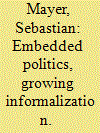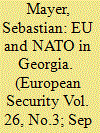| Srl | Item |
| 1 |
ID:
135006


|
|
|
|
|
| Summary/Abstract |
This article examines the issue of Common Foreign and Security Policy alignment—a procedure by which governments from the European Union's neighbourhood may support previously adopted Common Foreign and Security Policy documents. It provides a comparative theory test of Common Foreign and Security Policy alignment in Georgia, Armenia and Azerbaijan. In doing so it seeks to elucidate why they engage in alignment as well as how cross-country and cross-issue variance can be theorised. After reviewing the explanatory potential of power-based and sociological institutionalist theory, domestic variables are assessed. The essay shows that, contrary to frequently expressed assumptions, convergence is even possible in less institutionalised high politics fields. But it emphasises that it is largely conditioned by domestic institutional configurations, the preferences of individual or collective actors and overall state gains.
|
|
|
|
|
|
|
|
|
|
|
|
|
|
|
|
| 2 |
ID:
106769


|
|
|
|
|
| Publication |
2011.
|
| Summary/Abstract |
This article investigates changes in the ways NATO and EU states have pursued security since the end of the Cold War, and the repercussions for the state monopoly of external force. Both organizations have autonomous roles, security identities and norm-shaping abilities, making them more consequential than is often acknowledged. Using the analytical concept of internationalization - the increasing importance of political or administrative authorities beyond the nation-state - this article scrutinizes the institutionalization of new functions, mechanisms and operational roles within NATO and the EU's Common Foreign and Security Policy. The resulting process of internationalization can be labelled embedded security politics, a political order characterized by fragmented responsibilities in which underlying national preferences are altered by transgovernmental and transnational contacts and pressure to reach consensus, by thicker institutional structures of rules and common practices that constrain national decision-making, and by schemes that subject national capabilities for autonomous action to institutional and physical constraints. The desirable degree of internationalization is still contested among capitals. There are also unspecific signs of an informalization of decision-shaping or -making: governments use ad hoc networks outside the treaty-based international organizations, allowing more freedom with regard to the interpretation of institutional obligations. The article concludes that internationalization and informalization have more in common than is often admitted, with fundamental implications for the future of national action and security cooperation.
|
|
|
|
|
|
|
|
|
|
|
|
|
|
|
|
| 3 |
ID:
154468


|
|
|
|
|
| Summary/Abstract |
Focusing on fragile Georgia since the early 2000s, the article takes a country-centred perspective on EU–NATO inter-organisationalism. It outlines the regional strategies of these core Western security institutions and assesses their complementarity and overlap across three sets of tasks: defence and empowerment, crisis management, and security sector reform. While there is hardly functional overlap in the first and second sets, in the third the EU and NATO intersect to a considerable degree. Also, there is no significant inter-organisational cooperation over Georgia. One key conclusion is that while field-level overlap clearly jeopardises institutional effectiveness, overlapping toolboxes – as in crisis management – allow for institutional flexibility when one international organisation setting offers reputational or practical advantages. Against this backdrop, a case can be made contra propositions of merging the Common Security and Defence Policy and NATO.
|
|
|
|
|
|
|
|
|
|
|
|
|
|
|
|